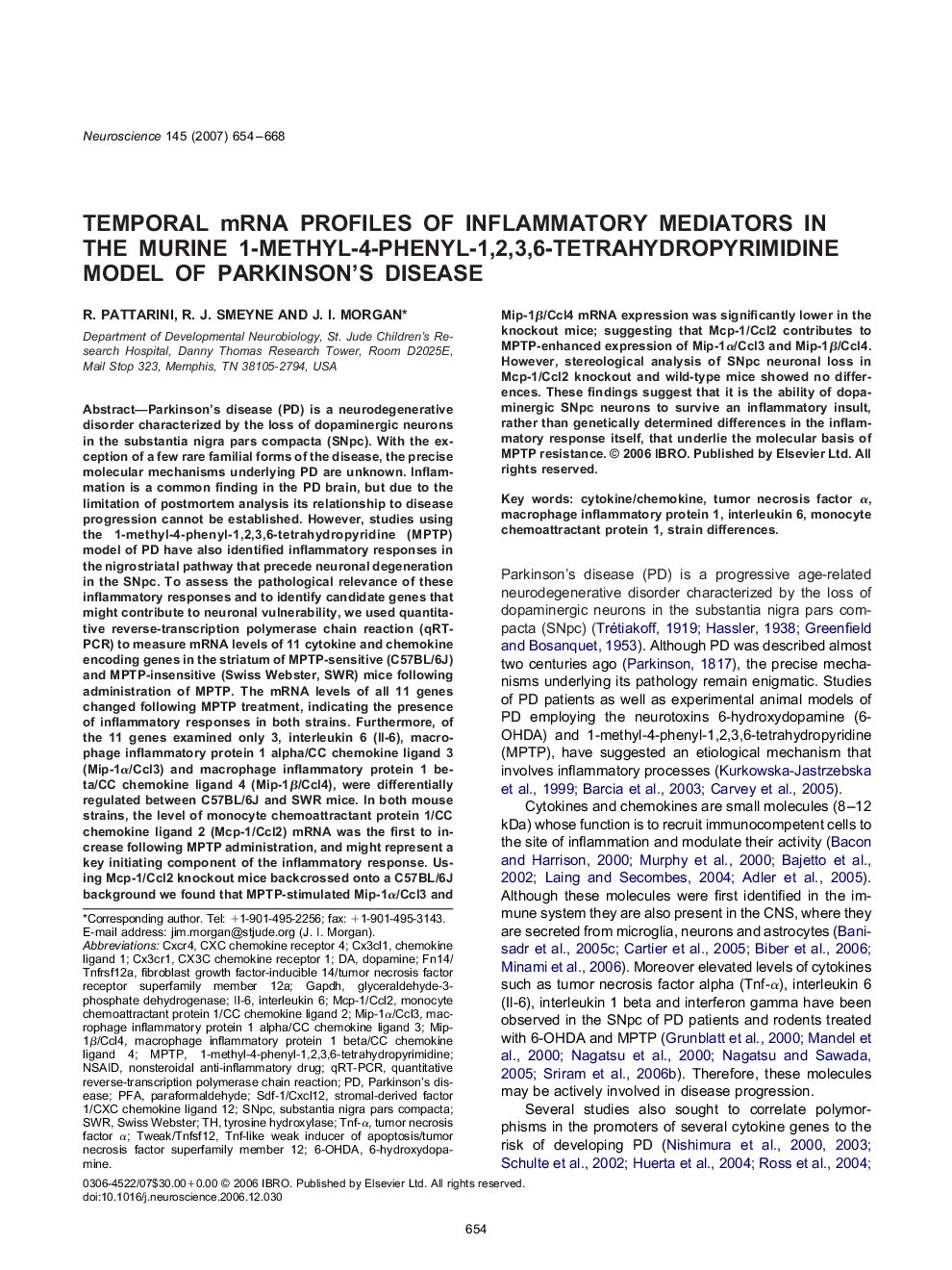| کد مقاله | کد نشریه | سال انتشار | مقاله انگلیسی | نسخه تمام متن |
|---|---|---|---|---|
| 4342739 | 1295888 | 2007 | 15 صفحه PDF | دانلود رایگان |
عنوان انگلیسی مقاله ISI
Temporal mRNA profiles of inflammatory mediators in the murine 1-methyl-4-phenyl-1,2,3,6-tetrahydropyrimidine model of Parkinson's disease
دانلود مقاله + سفارش ترجمه
دانلود مقاله ISI انگلیسی
رایگان برای ایرانیان
کلمات کلیدی
Swiss WebsterCX3CR1CXCR46-OHDAMPTPCX3C chemokine receptor 1CX3CL1PFAqRT-PCRChemokine ligand 16-HydroxydopamineGAPDHSDF-1/CXCL12NSAIDCytokine/chemokineIL-6SWRMCP-1/CCl2 - MCP-1 / CCl2SNpc - SNPCStrain differences - اختلاف فشارinterleukin 6 - اینترلوکین 6Parkinson’s disease - بیماری پارکینسونsubstantia nigra pars compacta - توده سیاه پارس متراکمtumor necrosis factor α - تومور نکروز عامل αtyrosine hydroxylase - تیروزین هیدروکسیلازnonsteroidal anti-inflammatory drug - داروهای ضد التهابی غیر استروئیدیDopamine - دوپامینTNF-α - فاکتور نکروز توموری آلفاquantitative reverse-transcription polymerase chain reaction - واکنش زنجیره ای پلیمراز کمی معکوس رونویسیparaformaldehyde - پارافرمالدهیدmonocyte chemoattractant protein 1 - پروتئین cheoattractant monocyte 1glyceraldehyde-3-phosphate dehydrogenase - گلیسرالیدید-3-فسفات دهیدروژنازCXC chemokine receptor 4 - گیرنده 4 شیمیایی CXC
موضوعات مرتبط
علوم زیستی و بیوفناوری
علم عصب شناسی
علوم اعصاب (عمومی)
پیش نمایش صفحه اول مقاله

چکیده انگلیسی
Parkinson's disease (PD) is a neurodegenerative disorder characterized by the loss of dopaminergic neurons in the substantia nigra pars compacta (SNpc). With the exception of a few rare familial forms of the disease, the precise molecular mechanisms underlying PD are unknown. Inflammation is a common finding in the PD brain, but due to the limitation of postmortem analysis its relationship to disease progression cannot be established. However, studies using the 1-methyl-4-phenyl-1,2,3,6-tetrahydropyridine (MPTP) model of PD have also identified inflammatory responses in the nigrostriatal pathway that precede neuronal degeneration in the SNpc. To assess the pathological relevance of these inflammatory responses and to identify candidate genes that might contribute to neuronal vulnerability, we used quantitative reverse-transcription polymerase chain reaction (qRT-PCR) to measure mRNA levels of 11 cytokine and chemokine encoding genes in the striatum of MPTP-sensitive (C57BL/6J) and MPTP-insensitive (Swiss Webster, SWR) mice following administration of MPTP. The mRNA levels of all 11 genes changed following MPTP treatment, indicating the presence of inflammatory responses in both strains. Furthermore, of the 11 genes examined only 3, interleukin 6 (Il-6), macrophage inflammatory protein 1 alpha/CC chemokine ligand 3 (Mip-1α/Ccl3) and macrophage inflammatory protein 1 beta/CC chemokine ligand 4 (Mip-1β/Ccl4), were differentially regulated between C57BL/6J and SWR mice. In both mouse strains, the level of monocyte chemoattractant protein 1/CC chemokine ligand 2 (Mcp-1/Ccl2) mRNA was the first to increase following MPTP administration, and might represent a key initiating component of the inflammatory response. Using Mcp-1/Ccl2 knockout mice backcrossed onto a C57BL/6J background we found that MPTP-stimulated Mip-1α/Ccl3 and Mip-1β/Ccl4 mRNA expression was significantly lower in the knockout mice; suggesting that Mcp-1/Ccl2 contributes to MPTP-enhanced expression of Mip-1α/Ccl3 and Mip-1β/Ccl4. However, stereological analysis of SNpc neuronal loss in Mcp-1/Ccl2 knockout and wild-type mice showed no differences. These findings suggest that it is the ability of dopaminergic SNpc neurons to survive an inflammatory insult, rather than genetically determined differences in the inflammatory response itself, that underlie the molecular basis of MPTP resistance.
ناشر
Database: Elsevier - ScienceDirect (ساینس دایرکت)
Journal: Neuroscience - Volume 145, Issue 2, 16 March 2007, Pages 654-668
Journal: Neuroscience - Volume 145, Issue 2, 16 March 2007, Pages 654-668
نویسندگان
R. Pattarini, R.J. Smeyne, J.I. Morgan,